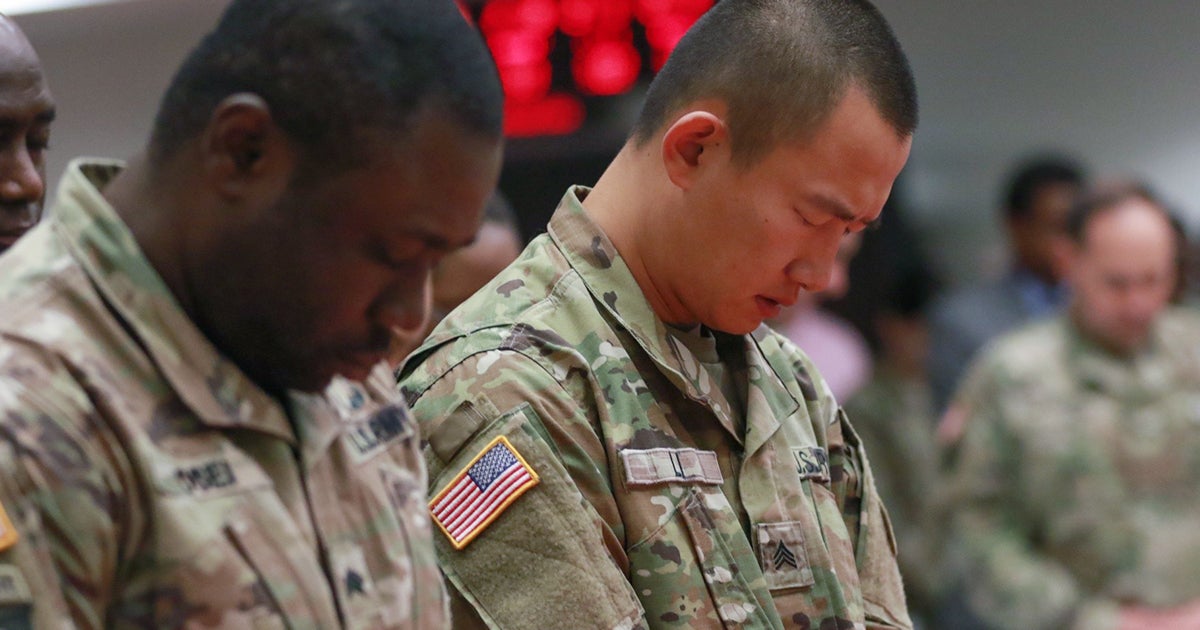
by Jorge Gomez • 6 min read
America has the strongest military in history, but even our brave service members are not immune to the havoc COVID-19 has wreaked.
That’s why it’s shocking that in the middle of a national health crisis, the radical Military Religious Freedom Foundation (MRFF) insists on brazenly attacking the freedom of our men and women in uniform to live out their faith.
The MRFF recently complained about a series of four videos posted on the Facebook page of the U.S. Army’s 10th Mountain Division Sustainment Brigade at Fort Drum, N.Y., in which two military chaplains appeared sharing inspirational religious messages in response to the COVID-19 outbreak.
One of the chaplains offered a voluntary encouragement: “You are invited to pray, to pray for the family, to pray for the sick, and to pray for our leaders.”
The other chaplain shared a similar message: “God encourages us not to be dismayed by what we see around us, things we cannot control. We can, however, with the best intel in this moment, place our trust in him, walk forward in his strength, and treat others with kindness.”
But according to the MRFF, it’s a violation of the Constitution for two chaplains to invite (not coerce or force) service members to pray. Or as they called it, an “illicit proselytizing” of Christianity. Sadly, the MRFF’s complaint caused the videos to be taken down from the Brigade’s Facebook page.
In response, First Liberty’s General Counsel Mike Berry immediately issued a statement in the national press, clarifying that service members praying is a legal part of military tradition: “Every president, from Washington to Trump, has publicly prayed for our military. If the commander in chief can pray, then our soldiers can, too.”
What’s more, they sent another letter to the Secretary of Defense demanding that a senior army chaplain be disciplined and possibly court-martialed for sending other chaplains an email containing a copy of John Piper’s new e-book, Coronavirus and Christ.
It sounds like the MRFF needs to get back to the fundamentals and original intent of the Constitution, as it appears they’ve created a mythical, far-fetched version where not even military chaplains are allowed to pray or live out their faith.
Hostility to religious freedom in our military is at an all-time high.
Let’s go All In together to defend the First Freedom of our service members.
The cruelest part of it all is that by attacking the religious freedom of these chaplains and bullying the Army to take down the videos, the MRFF essentially erased an opportunity for service members to find hope during a crisis. It’s common in times of distress for people (service members included) to turn to their religious beliefs for answers.
Oftentimes, for those serving in uniform, the closest and easiest point of access to religious counseling is a military chaplain. And one of their primary functions is to carry out religious services and activities, which includes encouraging service members to pray.
From a Constitutional perspective, military chaplains are the gateway to religious freedom in the military. Legal scholars have noted: “The military chaplaincy provides the best resource for protecting and facilitating the First Amendment right of service members to the ‘free exercise’ of religion.”
This is why it’s so critical to protect military chaplains against flagrant attacks of their rights.
History shows prayer and religious expression have been common in our armed forces even before the founding of our republic, particularly in times of national crisis.
For example, one of the most inspiring portrayals in American military history is Arnold Friberg’s “The Prayer at Valley Forge,” showing George Washington kneeling in prayer. In fact, on March 13, 1778, when the Continental Army was emerging from the worst of Valley Forge’s travail, he wrote to his favorite chaplain, Rev. Israel Evans:
“It will ever be the first wish of my heart to aid your pious endeavors to inculcate a due sense of the dependence we ought to place in that all wise and powerful Being on whom alone our success depends.”
At the most critical point of World War II, President Franklin Roosevelt asked America to join him in a prayer. His “Mighty Endeavor” prayer was transmitted on a national radio broadcast on June 6, 1944 (D-Day), as 160,000 Allied troops landed on the Normandy beaches.
At government expense, President Roosevelt also directed the printing and distribution of the Bible to troops and stated, “I take pleasure in commending the reading of the Bible to all who serve in the Armed Forces of the United States.”
Every president, from Washington to Trump, has publicly prayed for our military. If America’s Commander in Chief can pray, service members and military chaplains should be able to do so as well, and the Constitution guarantees them that freedom.
Religious liberty—including the freedom to pray—continues to be a respected and honored part of military life today. We see this evidence when chaplains lead daily evening prayers aboard U.S. Navy vessels. Or, even consider the fact that it’s a time-honored tradition for a military chaplain to offer a prayer before the Army v. Navy football game each year.
Bottom line, the MRFF’s most recent attack is unfounded. It has no basis in the Constitution or in our country’s longstanding military traditions.
Right now, during these times of crisis when our religious freedom can be particularly fragile, the MRFF’s blatant hostility makes it even more clear why we must go All In to defend and reclaim religious freedom for all military service members.